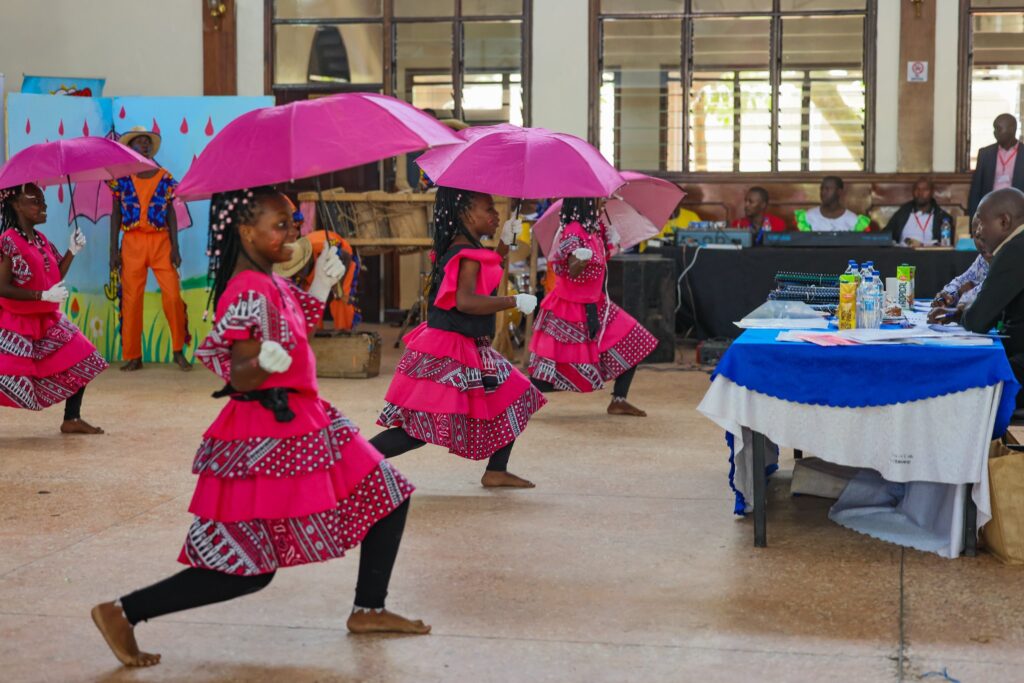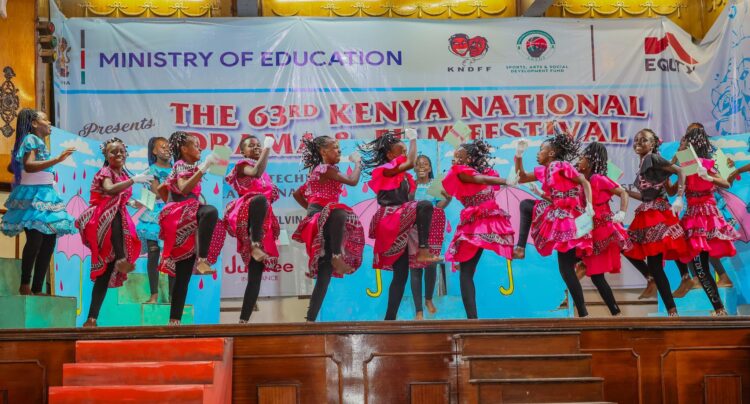Plays That Lit Up the Nakuru Drama and Film Festivals.
The 63rd annual Kenya Schools and Colleges National Drama and Film Festivals commenced in vibrant fashion at Melvin Jones, Nakuru, with students showcasing captivating and thought-provoking performances.
This year’s theme, Leveraging Technology to Nurture Learners’ Potential in Creative Arts, inspired fearless exploration of urgent societal issues. Participants used plays, poems, and dances to address topics ranging from road accidents and leadership failures to educational concerns and social injustices.
The sixth day of the Kenya National Drama and Film Festival continued to ignite passion, creativity, and bold reflections on vital social concerns. The day was marked by thought-provoking satire and stirring cultural performances that both entertained and challenged audiences.
Social Challenges
A standout documentary, Jinxed Junction by Londiani Boys, presented a harrowing account of the Londiani Junction tragedy that claimed 53 lives. The film highlighted how the incident had deeply impacted students’ lives, emphasizing the importance of road safety enforcement and responsible behavior.
Waa Girls offered a narrative, Deputy School Captain, illustrating how elected student leaders may abandon their principles and favor only those who supported them. The story delivered a lesson on leadership integrity and the need to serve all students fairly.
Golden Elites Academy from Kisumu presented a play, My Name is Joy, centered on the bullying of physically challenged students, while Alaro Junior School from Homa Bay staged Portraits of Life, a powerful performance on the devastating effects of drug abuse.
Healthcare Under Scrutiny
Maranda High School opened the day with their powerful narrative MakMende, highlighting the flaws in the healthcare system. The story followed student Desmond Ng’uono, who, after being misdiagnosed with a chest condition at a Level 5 hospital, traveled to India. There, it was discovered the real issue wasn’t his health but a faulty, cockroach-infested X-ray machine. The production was narrated by Hussein Mohammed and Bill Thoya, produced by Dr Edwin Namachanja, written by Brian Ong’iyo, and directed by Joshua Okoth and Janet Awuor. The performance balanced dark humor with a sobering message on medical negligence.
Inclusion, Discrimination, and Resilience Take Center Stage
Kitengela International School moved audiences with Sherehe, a choral verse capturing the exclusion of persons with disabilities. PCA Makupa from the Coast dramatized Winners’ Fears, telling the story of Anissa, a hardworking student at an international school, who—despite her academic success—faces jealousy and hostility from her peers.
St. Brigid Akoret presented Reason With Me, advocating for nurturing young people’s passions and interests to guide them toward fulfilling careers, while AIC Kaptien used the narrative Kashopingi to spotlight the often-overlooked discrimination faced by the boy child.
A New Stage: Live Broadcast Theatre
Lohana Hall hosted the festival’s debut of live broadcast theatre, a fresh and captivating genre that quickly became the highlight in Nakuru. Kitengela International Schools performed a dramatized television interview, where Brian Mwendwa played a calm host discussing urban farming under the Competency-Based Curriculum. Guest speaker Shavonne Evitta joined the conversation, which was complemented by visuals of chickens and rabbits. Directed by Nashon Omukhobero and produced by Elizabeth Gati, the production impressed audiences with its originality and smooth execution.
Modern Technology
Bishop Atundo Kimaeti from Western Kenya delivered a Swahili spoken word piece titled Kizazi cha Mtandao, reflecting on the harmful effects of social media on youth despite its educational benefits. This focus on modern technology resonated throughout the festival.
St. Peter’s Chemalul from Rift Valley performed The Swapping Game, addressing the negative influence of technology, and Mlimani Comprehensive School’s The Assignment depicted classroom distractions caused by unsupervised digital content, such as students watching cartoons instead of completing homework.
The Grip of Alcoholism
Riara School from Nairobi delivered a stirring performance titled Bottle Traps. The play, produced by Jane Mulinge, depicted the destructive impact of alcohol addiction on families and individuals. It powerfully highlighted how substance abuse continues to derail lives and tear apart communities, resonating deeply with viewers.

CBC and the Role of Education
Voi Primary School narrated a powerful tale of struggle, mentorship, and eventual success, emphasizing the role of a supportive teacher and the use of ICT under the Competency-Based Curriculum (CBC). Bungoma High School’s cultural piece, Biraro, celebrated CBC by portraying how a student applies CBC-acquired skills to solve a personal dilemma, acknowledging the mixed reactions CBC has received since its introduction.
Cultural Dance Meets Digital Innovation
Shadrack Kimalel Secondary School from Nairobi County presented Musiti, a lively Luhya cultural dance. The narrative followed a female hawker who, after repeated run-ins with city council officers, turned to e-marketing. This shift not only helped her avoid harassment but also contributed to urban cleanliness. Written and choreographed by Saumu Sabina and produced by Chief Principal Beatrice Shirao, the performance celebrated resilience and adaptation in a changing world.
Academic Fairness and Integrity
Kabarak University performed Missing the Mark, a compelling drama that questioned the subjective grading systems in institutions of higher learning. The play explored themes of fairness, integrity, and the pressures facing students in the academic space.
The Desert Queens Shine
Moi Girls Marsabit, affectionately known as the Desert Queens, energized the stage with a vibrant traditional dance. Their cultural expression was met with warm applause and appreciation from the audience.
Comic Brilliance with a Deeper Message
Mwaani Girls from Makueni County entertained with their oral narrative Mutulu, blending humor and wisdom. The story revolved around a student believed to be slow, who famously responded to a question on converting kilometres to metres with the remark that one should “just remove the kilos and remain with metres.” The audience erupted in laughter. However, the narrative revealed that Mutulu simply needed specialized learning support. Dr Elizabeth Mutinda produced the piece, with choreography by Sidney Chazima.
Tales of Struggle Abroad
Tetu Technical and Vocational College presented Mateso ya Ugenini, a choral verse that captured the harsh realities faced by Kenyan migrant workers in the Middle East. Many, having falsified documents to secure jobs, end up in difficult conditions once abroad. The piece was scripted by James Murunga and produced by Catherine Gikonyo, drawing attention to the cost of desperation and the need for ethical choices.
Read Also: Court Disputes Ogamba’s Claims of Script Tampering in Butere Girls’ Play ‘Echoes of War’
Protecting Marine Life
Vitengeni Baptist School from the Coast region showcased the Kiswahili play Samawati, a story of ambition, sabotage, and victory. It followed Sama, a determined student working on a marine conservation project, and Wati, the envious son of a minister trying to derail her efforts. Ultimately, the play emphasized the triumph of integrity over self-interest.
Politics and Resources on Stage
Mount Kenya University delivered The Tempest, a drama exploring the politics surrounding national resource allocation. Directed by Brammuel Asige Silingi, the piece probed the inequalities and tensions that arise in the distribution of resources across the country.
The Kenya Schools and Colleges Drama and Film Festivals continue to offer a vital platform for young talent to express themselves through drama, film, poetry, and dance. These creative works not only entertain but also provoke thought and raise awareness about key issues affecting society today.
Plays That Lit Up the Nakuru Drama and Film Festivals.
Follow Teachers Updates on Facebook, LinkedIn, X (Twitter), WhatsApp, Telegram, and Instagram. Get in touch with our editors at [email protected].



Discussion about this post